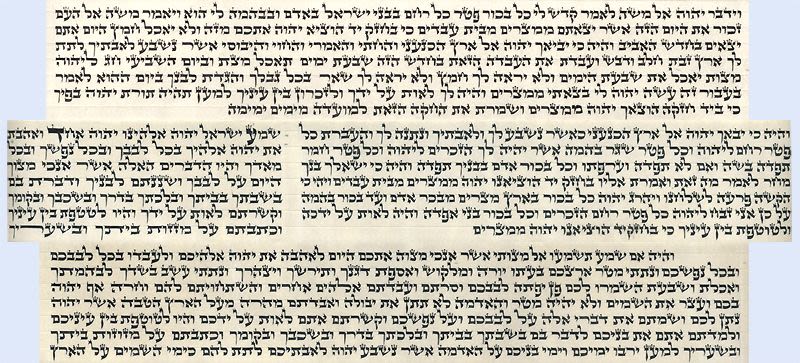
Korach: A Divided Heart
Korach was a charismatic demagogue. In his thirst for power, he tried to discredit Moshe (Moses) and to weaken...

“And Korach separated himself” (Bamidbar 16:1).
Korach was a charismatic demagogue. In his thirst for power, he tried to discredit Moshe (Moses) and to weaken Moshe’s leadership. With his slippery tongue, he almost lured the People of Israel away from Moshe’s influence, and Moshe was the most modest and unassuming man that ever walked the face of the earth.
The Midrash describes how Korach used his empty and warped but sweet-sounding logic in his rebellion against Moshe. Korach would say, “If one tiny mezuzah, with only two passages of Torah, can protect an entire house, then with a wall full of books that contain thousands of Torah passages, who needs a mezuzah?” His throngs of listeners would nod their heads in agreement. Then, Korach would call Moshe and challenge him in front of the masses by snidely asking, “A house has a wall full of Torah books; does it need a mezuzah?” Moshe would answer yes, definitely. Korach and his fellows would guffaw and chide, attempting to make a mockery of Hashem’s appointed leader of the Jewish people. Korach’s demagogic logic sounded good, but it was as far from truth as east is from the west. The truth is that Hashem requires a mezuzah, whether the house is full of books or not.
Korach separated himself from Moshe by trying to reduce the Jewish religion from a compendium of Divine commandments to a statute of human logic. By separating himself from Moshe, he also severed his ties with Hashem.
Jewish spirituality teaches that the human heart hosts two competing and opposite forces – the Yetzer Tov (good inclination) and the Yetzer Hara (evil inclination), which are strikingly parallel to Moshe (Yetzer Tov) and Korach (Yetzer Hara).
From learning about Korach, we learn the schemes of the Yetzer Hara. The Yetzer Tov, like Moshe, is fully aware of the absolute truth of Torah. Yet, the Yetzer Hara seizes control of the heart by introducing apparently logical arguments as to why the Torah is outdated or illogical. Like Korach, once a person succumbs to the arguments of the Yetzer Hara, he or she is doomed, destined to be buried alive under an avalanche of doubt, confusion, and agnosticism that only leads a person to unimaginable emotional, spiritual, and even physical difficulties.
Reb Natan writes (Kitzur Likutei Moharan I:62d), that the two forces of the heart are always at odds with one each other. While the Yetzer Tov endeavors to enhance one’s faith and knowledge of Hashem, the Yetzer Hara tries to conceal truth and to sow seeds of apikorsut (agnosticism). The way to resolve this conflict is by learning Halacha, or Jewish law, and by clarifying the different views of our sages in order to pursue the clear and designated path of Hashem’s will. By observing religious law, one makes peace in one’s heart, and the Yetzer Tov prevails to do Hashem’s will. By doing Hashem’s will, a person achieves holiness; furthermore, the channels of wisdom are opened and the person knows how to answer the demagogic claims of the Yetzer Hara.
Rebbe Nachman of Breslov and Reb Natan tell us to learn Shulchan Aruch – the Code of Jewish Law and all of its principal commentaries – over and over again. Without knowing what religious law requires a person to do, he or she is virtually defenseless against the false claims and misleading arguments of the Yetzer Hara that separate a person from Hashem, God forbid.
With Hashem’s guidance, the following parable will help us understand what Rebbe Nachman and Reb Nossen mean when they stress the need to learn Halacha:
Asher Lemmel was born in a shtetyl on the Ukrainian prairie. He’d never been to Berditchev or Vinnitza in his life, much less to the famed urban centers of Kiev or Warsaw. He had heard all kinds of stories about the seashore and the beautiful Black Sea coast in the southern Ukraine. He dreamed of visiting the beach, smelling the enchanting sea breeze, and eating a freshly-roasted fish. Other than haystacks and potato fields, he really didn’t know anything else.
For weeks and months, Asher Lemmel worked his fingers to the bone saving kopeck after kopeck to make his dream trip to the seashore. Gradually, the kopecks turned into rubles; with the glorious sum of 100 rubles, he now had the wherewithal to hire a wagon to Vinnitza, and from there to catch the train south to Odessa and the Black Sea.
Vinnitza was so different from Asher Lemmel’s quaint shtetyl, where everyone knew everyone else. Bewildered in the bustling train station, Asher Lemmel asked the ticket teller how to find the train to Odessa. Impatiently, the teller gave him a slip of paper. “Read this sheet, and stop holding up the line!” Asher Lemmel paid for his ticket, took the piece of paper printed in classic Russian script, and walked away.
Asher Lemmel never read much Russian. He knew the alphabet and enough day-to-day jargon to get by in his dealings with his non-Jewish neighbors, but for the most part, everyone in his self-sufficient shtetyl spoke Yiddish. He therefore couldn’t completely make heads or tails of the paper; to the best of his knowledge, the train to Odessa would be departing from the east-side platform.
A few semi-inebriated well-dressed Russian noblemen caught a glance of the perplexed Jewish country bumpkin. Looking for some laughs at the latter’s are expense, they slyly asked, “Can we help you?”
“This is the east-side platform, isn’t it?” asked Asher Lemmel. “Doesn’t the train for Odessa leave from here?”
“Of course not, silly Jew!” answered the first nobleman, while his comrade snickered. “Odessa is due south of here. Does it seem logical that the train leaving from an east-side platform should reach a destination in the south?”
Asher Lemmel looked again at the paper. He was sure that it read, “Odessa – east-side platform”, but the nobleman had shaken his confidence. He certainly had a logical argument. Suddenly, a train approached on the south-side platform. “Board it fast,” said the noblemen, “if you want to reach your destination.”
Odessa should have been an eight-hour train trip. After an entire twenty-four hours of chugging along the way with no end of the journey in sight, the conductor appeared, requesting the passengers to either pay or show their ticket. Asher Lemmel showed his and asked, “When do we get to Odessa?”
“Dimwit!” growled the conductor, “we’re on our way to Siberia! This is the east-bound train!”
“But I boarded in Vinnitza on the south-side platform; I want to go south!”
The conductor nearly beheaded poor Asher Lemmel, and explained to him that the side of the platform in the train station has nothing to do with the direction of the train’s destination. As the paper said, he should have boarded on the east side platform, rather than listening to the scoundrels who told him to board in the south. Asher Lemmel was in for a chilling surprise of ice and snow instead of his dream of surf and sand. If only he had heeded the paper…
The Yetzer Hara sounds just like Korach and the evil-intending Russian nobleman with his logical-sounding arguments. Yet, the only way a Jew can be guaranteed a successful journey through life is by putting his or her own feeble logic aside, and by relying on the strict adherence of Halacha as set forward by our Sages in the Code of Jewish Law. By derailing many a naïve and ignorant person from the track of religious observance, the Yetzer Hara transports his unsuspecting victims to the torture of purgatory after having convinced them that they’re actually on the train to eternal bliss. Don’t be fooled – listen to the advice of Rebbe Nachman and Reb Nossen, and learn Halacha on a regular basis. By performing Hashem’s will, hopefully we’ll all be on the train to the Beis HaMikdash, soon and in our time, amen.










Tell us what you think!
Thank you for your comment!
It will be published after approval by the Editor.